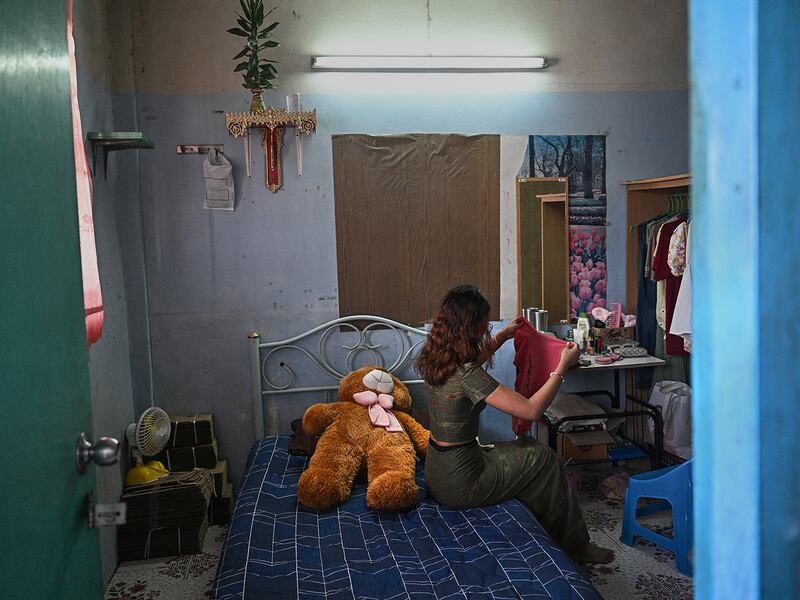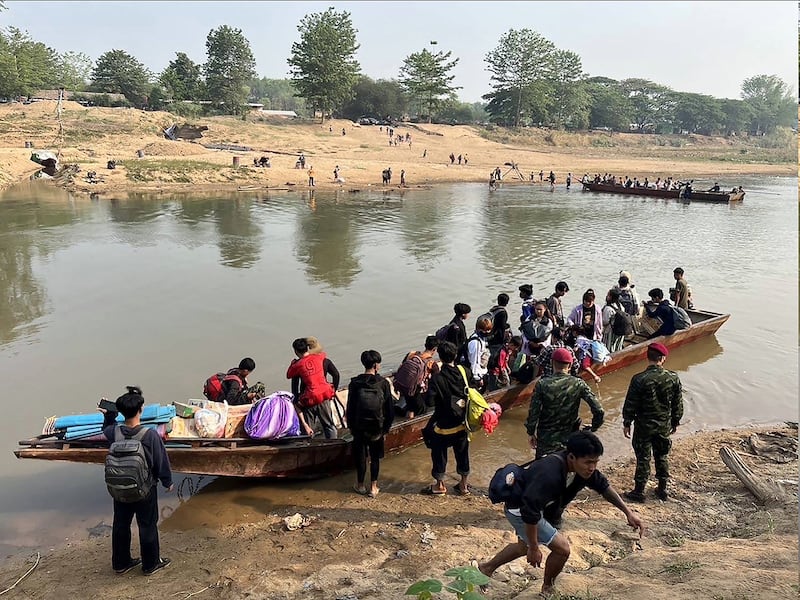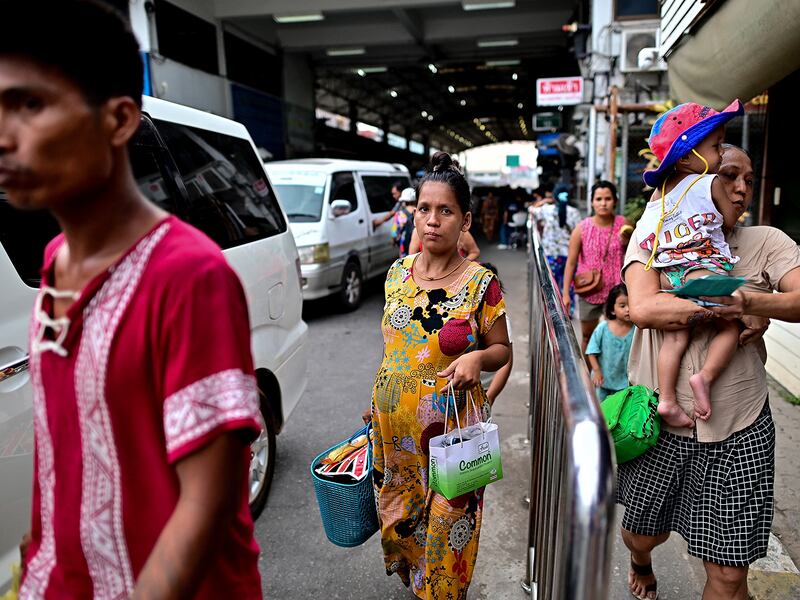The threatened deportations from Thailand of a Vietnamese ethnic minority activist and 48 Uyghurs detained after trying to flee China have cast a harsh spotlight on Bangkok.
But a flood of war refugees from Myanmar poses a bigger test for Thailand’s relatively generous policies toward migrants.
The Uyghurs, held in Thailand since 2014 after attempting to use the Southeast Asian nation to escape persecution in China, have said they fear they are about to be repatriated and staged a hunger strike to highlight their plight.
Vietnamese ethnic minority rights activist Y Quynh Bdap, who Hanoi wants to extradite and jail for terrorism, denies Vietnamese accusations that he committed 2023 attacks on government offices that resulted in nine deaths.
A Thai Immigration Bureau spokesperson said Thailand has “no policy” to deport the Uyghurs, while enforcement of a Bangkok court ruling calling for Bdap’s extradition to Vietnam is still pending.
These high-profile rights cases are playing out amid a bigger crackdown on hundreds of thousands of Myanmar citizens who have taken refuge in Thailand since a military takeover four years ago.
The displaced Myanmar citizens include junta opponents, but are largely ordinary people who seek safety and work as the civil war at home grinds into its fifth year, say those who help migrants in Thailand.
Many have been subject to arrest, involuntary repatriation and arrest again back in Myanmar as Thailand moves to regulate labor migration flows with stricter registration policies and stringent inspections.
“While all nationalities face similar risks, Myanmar nationals face dual risks – both political opposition groups and ordinary workers uninvolved in politics. If deported, they might be drafted into military service, risking their lives,” said Roisai Wongsuban, policy advocacy advisor for the Migrant Working Group, an NGO in Thailand.
Mecca for migrants
Along with scrutiny from rights and labor groups, Thailand gets plenty of credit from the United Nations and others for hosting more than 5 million non-Thai nationals.
“Because of its relatively prosperous and stable economy, Thailand has attracted millions of migrants from neighboring countries looking for a better standard of living,” said the International Organization for Migration, or IOM.
However, Thailand is not a signatory to the 1951 UN Refugee Convention, meaning it doesn’t recognize refugees, and those who seek asylum can face detention and deportation.
But it is a main base of humanitarian U.N. agencies and NGOs that help refugees in the region.
“The country has also traditionally hosted hundreds of thousands of nationals from neighboring countries, who have fled their homelands due to war, internal conflict or national instability,” the IOM, a UN agency, said in a statement.

Thai law has since 2016 recognized the principle of non-refoulement, or not deporting people to places where they face torture and other abuse.
But in practice, politically sensitive cases involving neighboring authoritarian states are handled differently, and Bangkok has cooperated with the rendition of Vietnamese, Lao and Cambodian dissidents by those nations' security agents.
A middle-income country with more than a fifth of its 67 million people over 60 and a low birth rate, fast-aging Thailand needs the workers.
“We must maintain a balance between providing employment for Thai nationals and managing migrant workers to meet business needs, enabling efficient operations across the manufacturing, agricultural and industrial sectors,” Thai Labor Minister Phiphat Ratchakitprakarn told reporters in Bangkok last month.
Thailand’s neighbors need the jobs and money.
Cambodia, Laos and Myanmar –- poorer states that border Thailand and have endured war, political violence and economic stagnation -– provide the “vast majority of Thailand’s migrant stock,” the IOM noted.
Laos said it took in more than US$600 million in remittances in 2023 from 400,000 migrant workers, mostly in Thailand.

An IOM report last month estimated that 5.3 million non-Thai nationals were living in Thailand as of December 2023, up from 4.9 million five years earlier.
The Thai Ministry of Labor says that more than 3 million Myanmar nationals were legally living in Thailand as of March 2024, while 286,000 Lao workers were legally working there as of last November.
The tally of registered Cambodians was 460,000 as of January 2024. Cambodia’s labor ministry published a figure of 1.2 million last year.
The IOM says that more than a third of the 5.2 million migrants estimated to be in Thailand as of July 2024 are in “irregular” situations, without proper documents and not captured in ministry statistics.
Such migrants suffer abuses such as unpaid wages, excessive working hours, and unsafe working conditions – or get trafficked to work scam centers in compounds neighboring states’ borders with Thailand, advocates say.
Conscription law exodus
What makes a Thai crackdown on illegal migrants dangerous for Myanmar ‘s war-displaced citizens are policies the Myanmar junta and the Thai government adopted in 2024, migrant advocates say.
After a military offensive launched across northern Myanmar by ethnic armies in late 2023 started to turn the tide against the junta, the regime last February passed a law imposing mass conscription.
Fear of getting drafted by the unpopular junta drove so many young men to flee to Thailand in 2024 that they set a record for the highest annual number of undocumented Myanmar migrants to arrive in Thailand.
This sparked anti-migrant protests in several Thai cities and waves of mass arrests for illegal cross-border entry.
Migrant labor advocates who tracked a 120-day Thai government crackdown on illegal workers from June to September said the drive led to the arrest of 300,000 people, including about 210,000 Myanmar nationals.
“When illegal immigrants entered Myanmar due to the conscription law, hundreds of thousands were arrested,” said Min Oo, a labor official at the Thailand-based Federation of Education and Development.

As a result of repatriations of migrants from prisons in Ranong, a Thai border town near the southern tip of Myanmar, about 800 people were handed over to the junta for conscription last year, said Thar Kyaw, head of the Meikta Thahaya Self Administrated Funeral Welfare Association.
According to Ranong locals, young men under the age of 35 were sent to three different Myanmar military units in the next-door Tanintharyi region. Disabled people were also arrested and their families had to pay ransoms to free them.
“Deporting Myanmar nationals is a violation of human rights and effectively a handover to the oppressors of the Myanmar people,” Thar Kyaw told RFA.
Tightening Thai policies
The surge in migrants from Myanmar prompted other Thai measures, including limits on daily entry visa applications at its embassies, elimination of visa renewal options and university places for students, and inspections and closures of migrant schools in southern Thailand.
“Although we pay taxes to Thailand in accordance with their laws, we still feel a sense of inferiority,” said Aung Kyaw, a Burmese student in Chiang Mai, the biggest city in northern Thailand. “And we constantly live on the brink of becoming illegal residents.”
RELATED STORIES
Thailand lets autocratic neighbors hunt down opponents on its soil
Thais scrutinized over Cambodian’s murder, Vietnamese, Uyghur detainees
Conscription escapees tell of forced junta recruitment, inadequate training
Thailand should end Myanmar junta’s control over migrants: NUG
Wongsuban of the Migrant Working Group said Thailand wants short-term workers but doesn’t want Myanmar war refugees to stay permanently – “which is why they don’t make it easy to apply for refugee status or get residence permits.”
Thailand is fine-tuning the “MOU system” it uses to manage the employment of migrant workers through bilateral Memoranda of Understanding with Myanmar, Cambodia, Laos and others.
“Managing migrant workers in Thailand must consider employment opportunities for Thai citizens, national security and prevention of labor trafficking or forced labor,” said Ratchakitprakarn, the labor minister.
The minister called on businesses employing migrant workers whose work permits are set to expire in mid-February to submit renewal applications or face “strict legal action against illegal migrant workers, as well as migrant workers and employers and businesses.”
Migrant workers and activists from Laos and Myanmar told RFA the high cost – often many months’ pay – and long wait for work permits under the MOU system drives workers to try illegal entry and work in Thailand. Illegal workers keep trafficking profitable, they add.

Phyo Ko Ko, who works legally at a garment factory in Thailand, told RFA Burmese the military junta back in Myanmar is now collecting taxes on registered migrant workers’ earnings, in another hit to her income.
“Workers only get a basic salary, so the money is spent on these visas and documents all year round,” said Phyo Ko Ko.
Thai media have reported on some promising developments for migrants, such as cabinet approval in October of a plan to grant citizenship to nearly half a million people, including long-term migrants and children born in Thailand, and new visas for digital, medical and cultural pursuits.
Despite the protests and crackdown of 2024, Wongsuban says the same economic priorities and necessities behind Thailand’s decision to accept migrant workers during the COVID-19 pandemic will ensure the flow of workers continues.
Even critics and activists work with the understanding that “Thailand is the only country in the region that accepts a high number of migrant workers, war refugees, asylum seekers and immigrants,” he said.
Reported by Nontarat Phaicharoen and Jon Preechawong for BenarNews, an RFA-affiliated online news service, RFA Burmese and Phouvong for RFA Lao. Translated by Aung Naing and Phouvong. Written by Paul Eckert.
